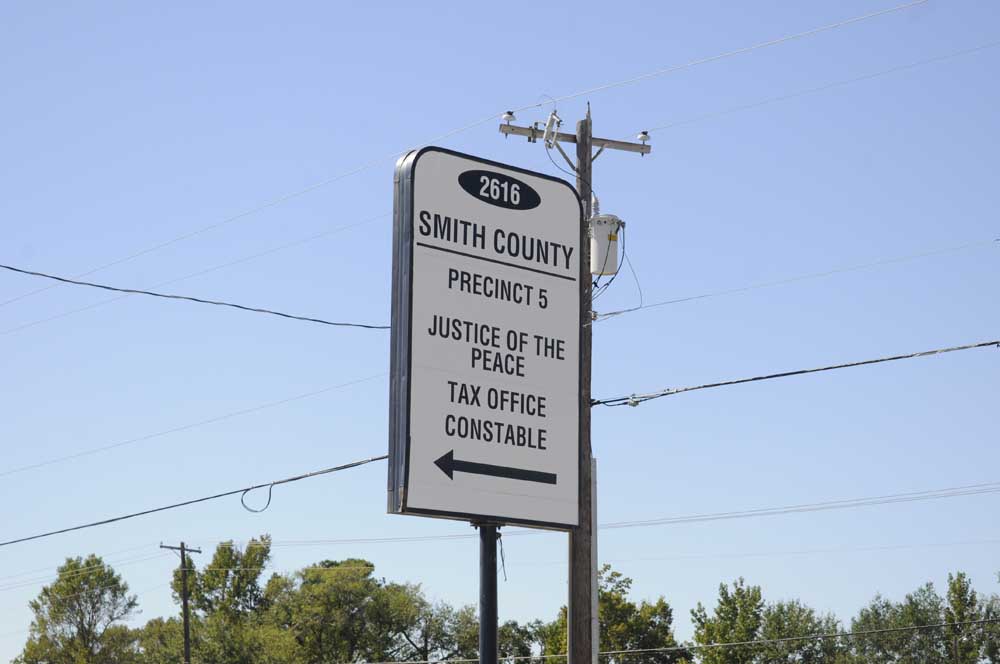JP Jon Johnson retires, reflects on six years of service
Published 5:45 am Monday, September 30, 2024

- A directional sign along the road guides visitors to the Smith County Precinct 5 Justice of the Peace offices. (Katecey Harrell/ Tyler Morning Telegraph)
After six years as Precinct 5 Justice of the Peace (JP) in Lindale, Jon Johnson is hanging up his judicial robe and taking a ‘peace’ of mind into retirement.
“I’ve enjoyed my time working for the people of Lindale, and now I just want to serve in other ways,” Johnson said. “I want to thank them for supporting me for these six years, and also just for their friendship.”
Trending
Johnson announced his retirement on Aug. 23 and officially retired Sept. 30. He plans to volunteer at his church, seek board roles, spend time with family and focus on his health.
In Texas, the JP provides accessible justice, ensures community safety, handles diverse cases and conducts death investigations, as established in the original state Constitution.
In college Johnson was undecided about his major until he took a criminal justice class that caught his interest. He didn’t want to be a lawyer but knew he wanted to be in law enforcement. After finishing his degree, he moved from northern Wisconsin to Huntsville, to attend graduate school at Sam Houston State, where he met his wife, Kimberli.
Johnson’s first job was as a prison guard in the federal system, where he learned to work with tough individuals without becoming hardened. He later became a federal probation officer and was assigned to Tyler, which he initially had to look up on a map, but he considered a blessing.
He moved to Lindale, and raised his children there, enjoying life in Smith County. He worked for 25 years for the Federal Bureau of Prisons and the U.S. District Court in Tyler until his federal retirement in 2014. Before taking office as JP in 2018, he taught criminal justice courses for Tyler Junior College and Lindale ISD.
Johnson was inspired to pursue elected office when he approached his predecessor Judge James Cowart at a high school football game and said, “Hey, Judge, congratulations on retiring. Tell me about your job because I may be interested.”
Trending
Judge Cowart encouraged him, shared details about his role and invited Johnson to observe him in court. Watching the judge hold court and discussing it with him, he was inspired by Cowart’s passion for his job, which ultimately motivated him to run for the position.
The role is dynamic, involving criminal cases, minor offenses like traffic tickets, small claims up to $20,000, evictions and administrative matters, including dangerous dog cases. Justices of the Peace also conduct court sessions and serve as county coroners in areas without medical examiners, managing about 200 death inquests annually alongside their other responsibilities.
To be a Justice of the Peace, one must heavily rely on clerks and fellow justices to address questions and concerns. The role is continuously evolving, with new issues arising regularly. Judges must frequently research the law and seek answers to grow as in the role.
The learning curve is steep; during the first year, it can feel like trying to “drink water from a firehose” due to the sheer volume of information, he said.
Despite the learning curve early on, Johnson quickly adapted to the demands of the role and grew increasingly proud of the staff he developed over the years.
He mentioned the staff he’s hired work well as a team and are always willing to help each other. They have a training program with monthly meetings that cover important topics to ensure everyone knows how to handle cases from start to finish.
Johnson appreciates how they ask each other who needs help when someone finishes their work. He believed in creating a positive work environment, stating that since “no one got rich working for the county,” he wanted to make the office a place where people enjoyed coming to work.
Johnson has worked closely with Chief Clerk Rebecca Alexander and Civil Clerk Gina Albritton, both of whom have been by his side for nearly his entire Justice of the Peace career.
Alexander described working with Johnson as “eye-opening and extremely educational.” She said he prioritized keeping the staff informed and up to date with changes in the law, while also making the work environment enjoyable, keeping the staff happy and engaged.
Albritton described Johnson as a “great boss,” noting his dedication to his employees.
She said Johnson took the initiative to address salary disparities, conducting research and advocating for raises to bring the clerks’ pay in line with similar counties. “He looked out for his employees,” she said.
Johnson credited Judge Cowart, who had served for 28 years, and long-serving chief clerk, Donna Crawford, as key mentors in his role.
“My first day of the job, (Crawford) took care of me,” Johnson said. “She said, ‘You’ve got court today, but I’ll sit in there with you. If you have any questions, just lean over and whisper to me.’ And I whispered a lot.”
He inherited an office filled with storage rooms full of files. Johnson saw the need to update the office’s filing system to better serve the community. To modernize, he shut down the office for a week to scan old documents into their database, aiming for a paperless operation.
It took about two years, but now the office is paperless, and his staff appreciates it.
“It’s a lot of work to do it, because there’s a lot of records we save forever, but once you make it digital, that becomes the original copy,” Johnson said.
In court, Johnson only uses a computer to access cases and documents, creating a more efficient and secure work environment. In the event of something disastrous like a fire, all data would be safe and backed up.
“A more digital era is making it a lot easier to process, a lot less room for losing track of papers or losing track of petitions and civil trials,” Alexander said. “It made us be able to work more efficiently.”
While he found great fulfillment in serving his community, he acknowledged that the role could be emotionally challenging and difficult at times. Evictions and inquiries were the most challenging parts of his job.
Evictions are tough because many people have heartbreaking stories, and while he feels sympathy, he must enforce the law. Inquests are difficult too, as he often meets families unprepared for a loved one’s death.
During these times, he comforts them, listens to their stories, and sometimes makes calls to funeral homes or relatives for support. He also mentioned the area’s poverty, noting that he tries to be lenient with fines by allowing community service instead, understanding that many struggle to pay.
Johnson aims to provide justice while being fair and compassionate.
He emphasized to his staff the importance of following the law with compassion, reminding them that they were dealing with individuals facing life’s challenges rather than criminals. He encouraged his team to remain polite, even when treated poorly by the public.
Johnson describes himself as a conservative by nature, valuing self-reliance and doing the right thing. He admires those who admit their mistakes, but has a strong sense for when someone is lying, thanks to years of experience with inmates.
“My lie meter is pretty good,” he said, adding that he often reminded people they are under oath.
Despite encountering dishonesty, his core values of honesty and integrity remain intact. As a judge, he aimed to resolve issues fairly and explained his decisions, noting that very few of his rulings are appealed.
“We have hardly had anybody appeal their cases, because (Johnson) actually does listen to both sides and renders a verdict and a judgment in the right way,” Albritton said.
Johnson shared that he and incoming JP Danny Brown, who ran against him in 2018, have remained friends. His advice to Brown was simple: “Trust the staff. It’ll take time to learn the duties of a judge, but they’ll be your biggest ally.” Johnson also emphasized that fellow JPs are just a phone call away. “He’s very experienced, and he’s going to do a great job,” Johnson added.
Albritton expressed mixed emotions about Johnson’s retirement, saying, “We’re excited for him, but sad for us.” She likened the transition to a clock, explaining, “You’ve got to let go of the past and embrace the future.” She added that Brown would take over as the “big hand” while Judge Johnson would be the “little hand,” and they would continue moving forward together.
Johnson said he would miss everything about his role, especially the friendships he formed within the county and federal government. After facing personal health issues and family losses over the past year, he decided it was time to retire, after 35 years in the system.
Initially, he planned to retire on Aug. 30 to attend all the Lindale High School games.
However, after discussing his retirement with his wife he realized he wouldn’t be eligible for Social Security until after his birthday in October. His chief clerk also advised him that staying through the end of the fiscal year would ease the transition for the new judge.
Johnson then withdrew his resignation and submitted a new one for Sept. 30.
Johnson feels good about his decision to retire, excited to spend more time at church, volunteering and enjoying life. He’s especially proud of his sons — Matthew, a dispatcher with the Smith County Sheriff’s Office, and Cody, a Dallas attorney, along with Cody’s wife, Cara.
“I call it my fourth quarter of life,” he said. “I’m looking forward to it, and we’ll see where God sends me.”





